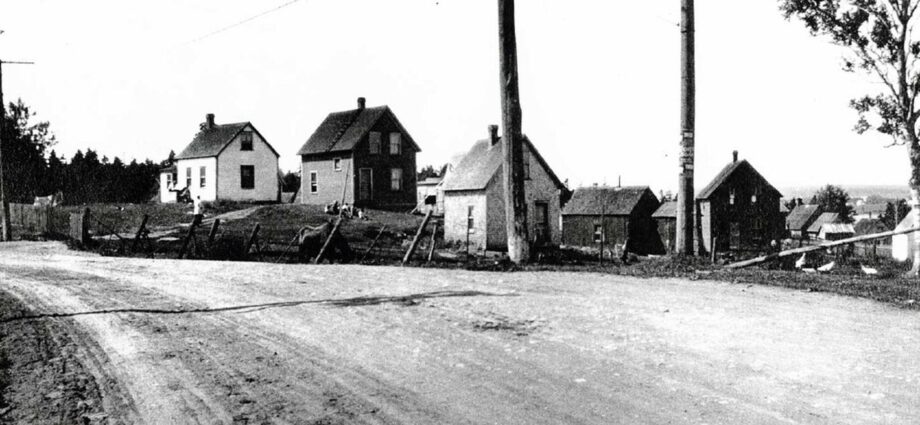
By Rosemary Godin, Local Journalism Initiative Reporter, Cape Breton Post
November 7, 2025
Membertou First Nation is moving ahead with its Kings Road Specific Claim against Canada and hopes to submit it to the federal government in 2026.
“We’re going to bring forward a strong case,” says Membertou First Nation executive director Trevor Bernard. “And we hope the process will not be an adversarial one.”
The year 2026 will mark the 100-year anniversary of the time the first homes were built at the present site of Membertou after the community was forced to move from prime waterfront land in Sydney.
The First Nation in Cape Breton is seeking to right the wrongs done in the early part of the 20th century when the historic community was forced from its two-and-three-quarter acre waterfront land and settlement. People lost their livelihoods; their homes; their skills and artifacts and their emotional and spiritual security.

Membertou First Nation executive director Trevor Bernard is leading the project on the Kings Road Specific Claim. CONTRIBUTED
ABUSE AND NEGLIGENCE
To add insult to injury, the site the Mi’kmaq were moved from along Kings Road sat virtually vacant for at least the next 20 years.
Bernard made clear this is not a treaty or title claim, but one looking for restitution based on administrative abuse and negligence by government.
Recently, a notice went out to the Membertou community that the work of preparing the Kings Road Specific Claim has reached a new milestone with Membertou hiring the services of Julie MacPhee of Patterson Law to serve as legal counsel. MacPhee is well-versed in Indigenous Law and was the lead negotiator and legal counsel in the recent land claim settlement reached between We’koqma’q First Nation and Canada in 2024.
In that case, the community was entitled to $125 million from the federal government.
RECONCILIATION JOURNEY
As a country, Canada has embarked on a journey of reconciliation among the Indigenous and non-Indigenous peoples as well as various levels of government to adequately address the long history of colonialism and the Intergenerational harm done to Indigenous peoples.
According to its website explaining the process of Specific Claims: “the Government of Canada is committed to renewing its relationship with Indigenous Peoples based on recognition of rights, respect, co-operation and partnership. Settling specific claims is one of many steps on the journey to reconciliation with First Nations and helps create a better future for everyone. Specific claim settlements help to right past wrongs, renew relationships and advance reconciliation in a way that respects the rights of First Nations and all Canadians.”
As a result, Canada put a policy and process in place for addressing specific claims through negotiations with First Nations.
The claim that will be submitted to Canada by Membertou First Nation details a particularly stark history of forced colonial aggressiveness.
When it was relocated from the Kings Road Reserve in 1926, by the Exchequer Court of Canada, it marked the very first time in Canadian history that an Indigenous community was legally forced to relocate.
CLAIMS TRIBUNAL
Membertou’s lead researcher, Gillian Allen, has created a draft historical report which will be a key document in the community’s submission. Bernard says the document, which includes information from such sources as the Mikmaw Treaty and Aboriginal Rights research Centre and Indian Affairs in Ottawa, will undergo a legal review to identify gaps and inform the final documentation.
“We hope to have our formal submissions prepared and submitted to Canada early in 2026,” he said. “The most desirable outcome after we submit the claim is that Canada agrees to negotiate a settlement with Membertou. If they do not accept the claim for negotiation, we will need to consider our options which include submitting our claim to the “Specific Claims Tribunal of Canada” that can hold hearings, rule on the validity of the claim and determine appropriate compensation.”
The Claims Tribunal was established in 2008 and is part of the federal government’s “Justice at Last” policy — a joint initiative with the Assembly of First Nations. The term “specific claims” generally refers to monetary damage claims made by a First Nation against the Crown regarding the administration of land.

Bernard said there has been a lot of awareness around what happened to the ancestors in the early 1900s and today’s community members are eager to have a resolution to repairing the harms that were done.
“We are confident that we have a strong claim and remain committed to a positive outcome for the people of Membertou,” he said.
Subscribe to our newsletter.
Rosemary Godin is the Local Journalism Initiative reporter for the Cape Breton Post, an initiative funded by the federal government.


